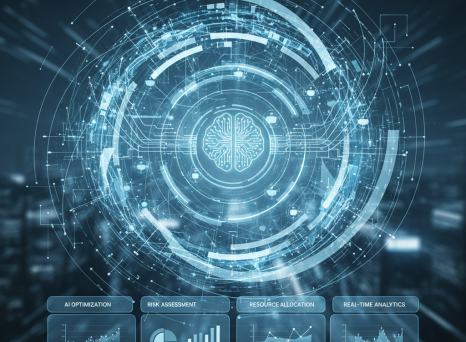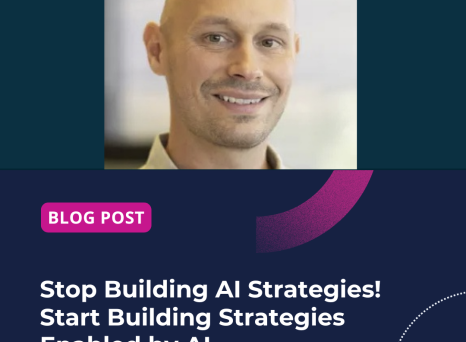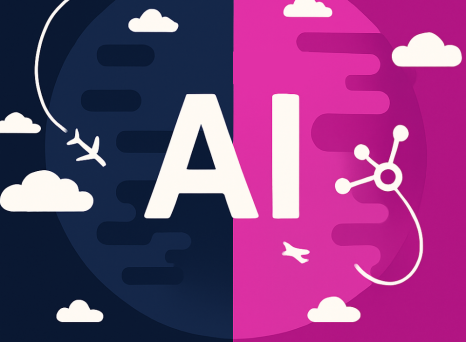Looking for that extra button on your keyboard to automate the tasks that take up an unnecessary amount of your day? Artificial Intelligence, although still in its infancy, might (in the near future) be the answer to these tedious project management tasks. In fact, the things people like least about their jobs tend to be good candidates for automation so as far as we're concerned these innovations can't really come fast enough.
Why use AI in Project Management?
To dig deeper into the ways AI could change Project Management, it's important to grasp the main issues that are prompting more and more PM professionals to implement AI systems.
According to Marcus Glowsaz, there are 3 pain points that every project manager faces:
1. Uncertainty
2. Forecast
3. Learning
Improving one (or all three) of these could be a significant step to improving overall project success rates. AI is one tool that could be useful in this context. The question then remains whether project managers are willing to embrace artificial intelligence as a tool.
We debated this topic in a webinar on AI where Peter Taylor broke down how project managers could prepare for this disruptive change, and what tasks will likely be automated in the future. An informal poll from the audience showed that project managers are overall quite eager to see what capabilities AI could offer.
Figure 1: Areas AI could be most useful in project Management
Figure 2: Willingness to use AI in the future
With its ability to process huge datasets (something that a human brain is not designed to do to that extent), AI holds the promise of better decision-making through higher accuracy and the ability to spot patterns that would otherwise have gone unnoticed.
Potential Changes AI could bring to Project Management
With AI adoption continuing to grow within organizations and benefits remaining significant even throughout the COVID-19 pandemic, it's essential for project managers to understand where exactly AI could have the biggest impact.
Change #1: Better decision making
One of the perennial issues of project management has been the gathering of enough accurate and up-to-date information for good decision-making. AI's ability to process massive datasets in real-time, along with a shift in organizations' mindset towards better data gathering could help bridge that gap, and power better decision-making. The ability of deep learning to relate completely different types of information and find patterns that a human would almost certainly have missed could be a true game-changer for project management.
- AI has the potential to identify (in real-time) abnormalities in data sets and draw the managers' attention to project changes that could have a material impact on the project (schedule, budget, timeline, financials of the project...). In an ideal world, the AI system would automatically surface key data that will impact project success, making it easier for the upper management to take the right decisions.
- AI can aid in contextualizing data by providing more information than what a classic system would, connecting the data being viewed with information from other parts of the system that add meaning to this particular set of data (often about the environment: limitations, requirements, etc.). AI and context data can play a key role in filling the knowledge gaps and reducing the uncertainty that comes with evolving markets and also allows companies to deploy continuous intelligence and real-time analytics to inform rapid decision-making. This enables the project manager to see the bigger picture in relation to a project and react nimbly to situational changes.
- AI can help identify new patterns: AI has the potential to spot new trends and point out to a project manager when a new variable can have an impact on how projects unfold (if a new type of delay appears for example). This will keep the project manager on the ball with the latest data that has an impact on the project schedule, budget, or timeline.
Change #2: AI Active Assistance
AI active assistance or AI virtual assistant is playing an increasingly large role in eliminating lower-level repetitive tasks and therefore, freeing up project managers so they can focus on more value-added tasks. A couple of tasks that stand out include:
- Data entry and collection
- Error detection
- Smart workflows that send out actions and follow-ups tailored to each project
- Assigning user stories to team members based on their capabilities
- Predicting client satisfaction based on previous results.
Our favorite example of AI as an active assistant to humans is chess legend Gary Kasparov who decided to partner with an AI after losing his famous rematch against IBM's Deep Blue supercomputer in 1997 - Gary won the first match in 1996. As Kasparov played more matches against players of different levels he noticed that the power of working with an AI was coming from how the human and computer were able to complement each other.
Interestingly, amateur players who effectively coached their computers were able to defeat the combination of a chess grandmaster and a PC with great computational power. Therefore, when we talk about the potential for AI virtual assistants to transform project management, the success of the partnership will really depend on how well humans and computers will interact.
Change #3: Project risk management and mitigation
AI has the capacity to quickly run multiple scenarios and assess the risk of future projects due to its calculation capacity. Unlike current tools, where you have to point them in the right direction, the deep learning algorithm could potentially dig out possible risks unprompted.
This ability to process massive datasets ensures issues and dependencies that would have otherwise gone unnoticed are taken into account in the simulations and improve the quality of the proposed mitigation plan. And it can repeat the calculation as newly updated data arrives.
The main areas where AI systems offer the most potential in project risk management are:
- Making more accurate cost and time forecasts using empirical data thus reducing cost and time overruns in portfolios.
- Finding problems in projects earlier (using data analytics PMs can pinpoint which of their projects are at most risk of over-run and under-run and therefore, identify activities that are going to impact troubled projects the most).
- Designing more effective mitigation plans, and finding better solutions to manage risks that have been realized.
- Improving adaptation and learning.
Change #4: Resource Management and Capacity Planning
AI systems hold the promise of enabling project managers to better execute future projects through more effective resource allocation. As a result, organizations can anticipate needs and adapt schedules accordingly. The ideal AI system will aid project managers with capacity planning strategies taking into account all the relevant aspects of the project including workforce, facilities, schedules, budgets, and supplies. A by-product of this augmented planning is a happier workforce as tasks are delegated based on past performance and the overall capacity of the employee.
The different ways AI could help improve the processes used to manage people include:
- Calculating the best allocation of resources and predicting resource shortages or excess
- Identifying the right skills for the right job
- Providing feedback on project performance
- Pinpointing a specific training for a specific employee
- Improving capital productivity (reducing disruptions for employees can have a significant impact on company performance)
AI as a complement to project managers
The problem with decision-making is that we often do not know what all the game pieces are and the boundary of the gameboard. With AI as a complement to humans, project decisions will be based off a much larger pool of data and with a LOT more calculation capacity. This will broaden the project manager's view on the entire landscape of projects (a bit like removing horse blinders), and allow them to react faster and with better solutions to evolving business environments.


